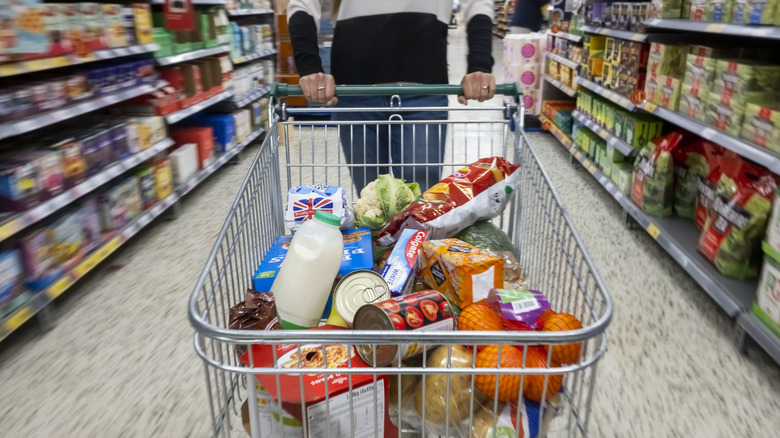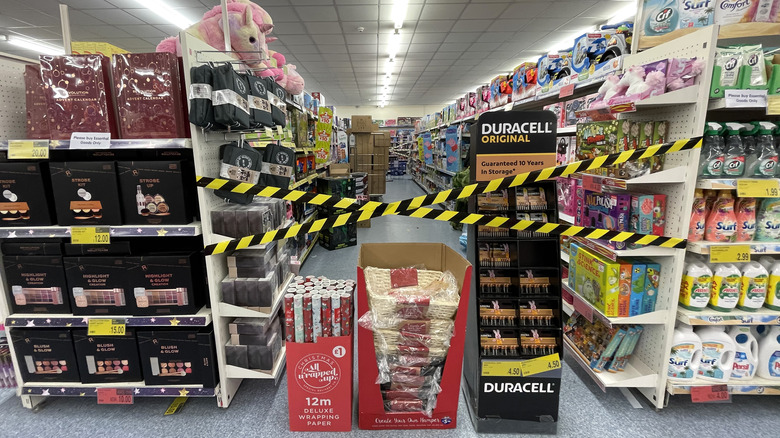How Has 'Supermarket Culture' Affected Recent Food Shortages?
At U.S. grocery stores, the idea of shopping for pleasure may have taken a back seat to empty shelves, rising costs, and lower quality. Although the COVID-19 pandemic revealed supply chain issues, economic indicators always influence a shopper's bottom line. As consumers better appreciate terms such as inflation, shrinkflation, and impact to the food budget, grocery shopping might feel more like a minefield than an enjoyable experience. And in some ways, "supermarket culture" may have pushed consumers out the door.
Walking into a grocery store may feel as if there is an invisible hand guiding shoppers towards certain areas. As National Geographic explains, the store layout, lighting, and even music have been carefully cultivated to make the shopper add more items to their cart. Even before the checkout line impulse buy, there is a psychological approach to getting people to stroll the aisles. From the engaging cereal box characters to a BOGO savings promise, there are options to stray from that carefully crafted shopping list. Add to that situation a favorite product being out of stock; the store-brand competitor could be filling the shelves.
Although some people might consider it manipulation, the reality is that supermarket culture comes down to its real purpose: generating profits for food businesses.
The three major factors that impact supermarket culture
From the invention of the shopping cart to the self-checkout lane, the supermarket finds new ways to evolve to keep consumers engaged. While today's grocery stores need to take into account both in-person and virtual shopping, the reality is that three factors — convenience, quality, and prices — are the main drivers for shoppers. But NBC News asserts those concepts are often at odds, which can cause breaking points within the grocery industry. In turn, consumers can be at the mercy of higher costs, less selection, and overall lack of shopping satisfaction.
Given that the grocery business is reliant on other industries for putting food on store shelves, the constant give and take needs to find some type of balance. When labor is pushed to its brink, the truck driver may not want to drive longer to arrive on time. That decision can lead to fewer products on shelves, a fluctuation in price, or potentially a sub-par item because it sat too long in transit. Given that people are reliant on stores for many basic staples, the fluctuations in convenience, quality, and prices might feel like a roller coaster ride of ups and downs.
Even though everyone would like an overflowing organic food section that doesn't cost an arm and leg, that concept isn't part of the real world. Until all elements of supermarket culture take a different approach, grocery shopping might feel more like a thrill ride than a pleasurable experience.
Does the UK have a solution to fix the broken supermarket culture?
In the U.K., empty store shelves and rising food costs have caused frustration among shoppers. Henry Dimbleby, sometimes referred to as the "U.K. food tsar," told The Guardian that the country's "supermarket culture" has created a no-win scenario for all. Specifically, he said, the U.K. competitive dynamic is unlike other countries, and it is unclear why the situation has yet to find a remedy.
Dimbleby believes that fixed price contracts between supermarkets and suppliers are causing the shortages. He asserts that market conditions need to be considered. Further discussion questioned the government's lack of intervention as consumers saw empty shelves across stores. Without government action, the consumer seemed to be impacted the most.
While industry evolves based on a variety of factors, the idea of supermarket culture is more than just a concept of what, how, and why food is stocked on store shelves. The interconnection between suppliers, stores, and consumers cannot be ignored, nor it cannot happen within a vacuum. By addressing all components within the system, the concept of reasonably priced, quality food, presented in a convenient manner, can be achieved.


